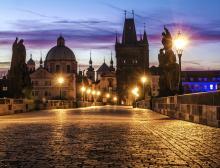Prague (plus Vienna, Krakow, Budapest, and Berlin), Czech Republic
The Prague Program offers students a unique study abroad experience not available elsewhere at UW. Prague has a magical flair like no other: a medieval cultural capital located in the heart of Europe, yet for decades seemingly locked away behind the Iron Curtain. Relatively spared from natural disasters and war, Prague boasts magnificent architecture preserved from its distant past, and is the home to world class theatres (think Mozart), labyrinthine cobble-stoned streets (think Kafka), and tucked-away bars, gardens and cafe's where you can contemplate the meaning of it all. One of the things that makes Prague special is its contradictions: it's both big as well as cozy, it's rich as well as poor, both "Eastern" and "Western", quiet and wild, and really old yet unmistakably reconfigured by the communist regime (1948-1989) as well as the capitalist system that replaced it. The Prague Program, which is one of the oldest CHID study abroad programs at UW (since 1996), is all about immersing yourself in Prague and the Czech Republic, where we explore the dynamic historical, cultural and political life of Central Europe. We focus on key issues that resonate well beyond Central Europe: the tragedy of the Holocaust, the nature and impact of the communist system, the hopes and tensions of the European Union, and how coming to terms with the past is reflected in the cultural and art scene we witness today. We also reflect on the very meaning of Central Europe. Does Central Europe even exist? The question has for over a century occupied European intellectuals like Walter Benjamin or Milan Kundera, and continued to be reframed by the World Wars, a divided Europe during the Cold War, and the contemporary European integration. We travel across the region to Vienna, Krakow, Berlin and Budapest to explore the commonality and diversity of Central Europe and to see how, as Christa Wolf expressed it, today is the last day of the past. The Prague program is intensive both academically and experientially, often at the same time. The classes directly connect, for example, with our talks with journalists at Radio Free Europe in Prague or with a variety of civic activists fighting for asylum and refugee rights, media freedom, government transparency, and environmental protection in Poland and Hungary. What might seem abstract at one moment becomes crystal clear the next when we walk through Auschwitz, visit communist museums, or witness street demonstrations. Thus, to a large degree, the site, or rather the sites ARE the academic contents of the program. But we do all of this with a heavy dose of fun: we go biking in all of the cities to explore the urban landscapes, visit hot spas to witness the Ottoman influence in the Habsburg monarchy and hike in national parks to discuss the climate change. We also go see opera, ballet and contemporary art performances in Prague's beautiful theaters. In addition, we encourage students to go on short one-day trips on their own to other wonderful places in the Czech Republic and the region during the three-day weekends. Through this immersion, we hope that students in the program not only critically explore the intersections of rich and complex Central European history, society, and politics, but also, in the process, become themselves transformed by the places, people and ideas they encounter.
- CHID 390: Collective Memory, Civil Society, and Public Space (5 credits SSc, W)
- POLSCI 495 or CHID 471B: Democracy and Development (5 credits SSc)
- HSTEU 490 or CHID 471A: East European Communism and Everyday Life (5 credits SSc)
*Note that the fees stated above do not include some additional costs, including, but not limited to: airfare and personal spending money. These costs will differ by program. Be sure to read our Fees, Financing, and Withdrawal information for details about the fee structure and payment schedule.
